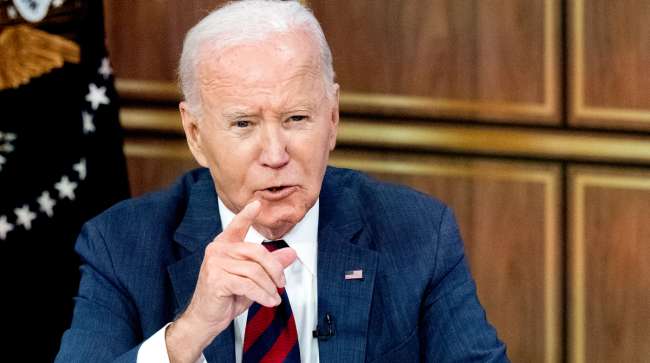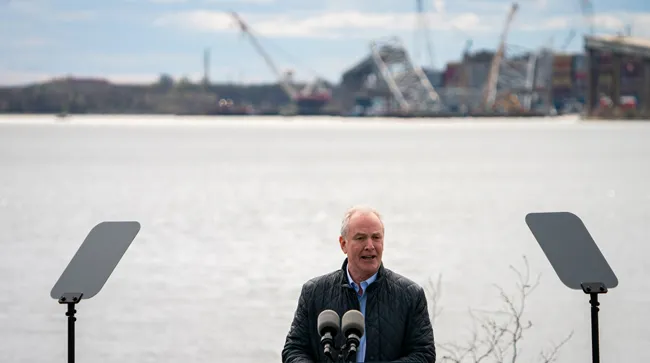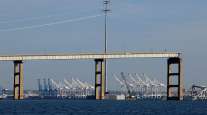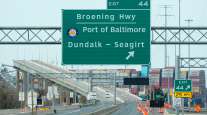Senior Reporter
White House Again Asks Congress for Baltimore Aid

[Stay on top of transportation news: Get TTNews in your inbox.]
President Joe Biden again urged Congress to dedicate emergency funds to rehabilitate the Port of Baltimore region months after the collapse of the Francis Scott Key Bridge.
In a letter to the leaders of the House and Senate, the president described Baltimore and areas recently hit hard by severe weather events as being in “urgent need of disaster assistance.”
“I urge you to keep faith with those communities and provide the requested additional funding to rebuild housing infrastructure, to support farmers and ranchers with crop losses, to address impacted schools, and to repair damaged federal highways,” Biden wrote Oct. 4 to Speaker Mike Johnson (R-La.), House Minority Leader Hakeem Jeffries (D-N.Y.) and Sens. Chuck Schumer (D-N.Y.) and Mitch McConnell (R-Ky.), the chamber’s majority and minority leaders, respectively.
Biden went on to insist congressional leaders “act with all appropriate speed and provide comprehensive disaster relief” when lawmakers resume their legislative agenda after the election. Congress has yet to approve long-term relief aid to rebuild the bridge, which collapsed in March. The White House has requested about $3 billion to rebuild it.
The House and Senate are scheduled to begin the post-election work period the week of Nov. 11. Atop Congress’ agenda is approving fiscal 2025 funding for the federal government. Budget authority for agencies, such as the Department of Transportation, expires Dec. 20.
In calling on colleagues to support assistance that would enhance Maryland’s freight corridors, Sen. Chris Van Hollen (D-Md.) said he anticipates negotiations to pick up after the election. As he put it during an interview with Fox 5’s “On The Hill” on Oct. 6, “We would at that point in time make it clear that 100% of federal funds will be available for the replacement of the Key Bridge.”

Van Hollen speaks at the Maryland Transportation Authority Police headquarters in Dundalk, Md., on April 5. Key Bridge wreckage appears in the background. (Al Drago/Bloomberg News)
Van Hollen added, “The collapse of the bridge has created even more intense traffic problems — congestion issues — around the Baltimore area. The good news is we were able to open the port very quickly by clearing the channel. But replacing the bridge will take time.” The senator is chairman of the Financial Services and General Government Appropriations Subcommittee.
Maryland’s congressional delegation has proposed legislation meant to facilitate access to federal funds for rebuilding and rehabilitating infrastructure at the Port of Baltimore. Their bipartisan Baltimore BRIDGE Relief Act has yet to be considered. “We have made good on our commitment to America and our state by introducing companion legislation in both the House and Senate to build back the bridge and build it better. A disaster of this scale requires nothing less than the full and total cooperation of all parties involved,” said Rep. Kweisi Mfume (D-Md.) during the bill’s introduction.
McLeod Software CEO Tom McLeod explores the potential for artificial intelligence to boost efficiency and build resilience. Tune in above or by going to RoadSigns.ttnews.com.
This summer, Acting Under Secretary of Transportation for Policy Christopher Coes reflected on the collapse during a hearing with senators, “We experienced a painful reminder of the criticality of our nation’s bridges to our daily lives and to our economy when the Francis Scott Key Bridge in Baltimore collapsed after being struck by a containership.”
Coes added, “We worked rapidly with multiple partners to reopen the federal channel and Port of Baltimore in less than 100 days and continue to work with them on rebuilding the Key Bridge. Even before that incident, we have been working with communities across the country to rehabilitate and replace aging critical bridges.”
Six construction workers were killed after the containership struck the bridge on March 26. The Federal Highway Administration provided Maryland with $60 million in emergency aid. The National Transportation Safety Board’s investigation is ongoing.
Want more news? Listen to today's daily briefing below or go here for more info:





